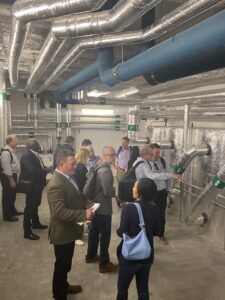With ambitious goals of fossil-fuel-free operations and net-zero greenhouse gas emissions by 2040, Stockholm has become a front runner in sustainable urban development.
Stockholm has implemented sustainable solutions in the building sector such as innovative thermal networks and waste heat recovery projects, embarking on building and district-level electrification initiatives, and mandating Passive House-level performance standards for municipal buildings. Stockholm’s successes present a major opportunity for knowledge exchange and collaboration between New York City and Sweden, reinforced by the closely aligned climate objectives.
The Swedish Energy Agency and Smart City Sweden arranged a three-day programme consisting of leading US companies interested in solutions related to smart solutions for energy, infrastructure, energy efficiency and reduced climate impact. The visit was a result of previous engagements between the Swedish Energy Agency, NYSERDA and BE-Ex during Climate Week in 2022, where common challenges and interests were identified.

The delegation at a study visit
The visit included workshops with Swedish agencies, technical experts from the industry, as well as study visits and meetings with Swedish business representatives. One of the topics covered during the visit was retrofitting of old buildings in an energy-efficient and sustainable way. On the first day, the delegation met with the GrowSmarter team and visited three GrowSmarter projects. One of these was Valla Torg, a district that has been working on energy-efficient refurbishment of social housing and private residential buildings, and energy retrofitting of buildings. Heat pumps were another area of focus of the visit. At Valla Torg, solutions like feed-in of waste heat from data centres into district heating, geothermal heat pumps and exhaust air heat pumps and heat recovery from wastewater were presented.
On day 2, the group made a visit to Hötorgshusen, four high-rise commercial properties constructed in the 1960s, where the buildings utilize geo-energy combined with heat pumps using CO2 as a refrigerant.
The delegation also met with companies such as Stockholm Exergi to hear more about district heating and other resource-efficient solutions. Another focus was carbon capture technologies; a part of Stockholm Exergi’s mission of making zero emissions a reality.
For more information, contact Lidia Partheni: [email protected]